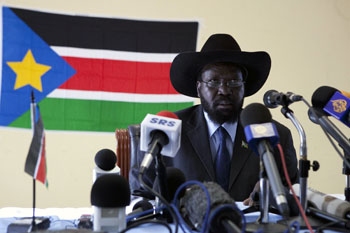
ADDIS ABABA, Ethiopia — Over the weekend, South Sudan’s leaders began the process of shutting down oil operations in their country, following on the threat to do so during negotiations with Sudan in the Ethiopian capital of Addis Ababa.
The decision follows a series of unilateral measures taken by Khartoum, who has confiscated what South Sudan calculates to be $815 million worth of oil. Since late November, the Sudanese government has also prevented vessels loaded with oil shipments already sold to buyers from leaving Port Sudan. In a speech before the national legislature today, South Sudan President Salva Kiir described the decision as a means of protecting national property:
The diversion of South Sudan crude has disrupted revenues that are vital to the security and welfare of the people of South Sudan. At this time, we have no guarantee that oil flowing through the Republic of Sudan will reach its intended destination. We cannot allow assets which clearly belong to the Republic of South Sudan to be subject to further diversion.
The Council of Ministers voted unanimously to shutdown operations. South Sudan also announced that it was launching an investigation into the confiscation of oil and suggested that purchasers of the stolen goods “may be liable to suit.”
In a statement issued last week, Khartoum said it was entitled to take oil from South Sudan because it was not receiving payments from Juba for the use of oil infrastructure in the North.
But negotiations over Sudan and South Sudan's oil relationship, including how much Juba should pay for the use of oil infrastructure, are still ongoing and inconclusive. Both states' actions threaten to undermine the process.
At the current round of talks in Addis, the shutdown of operations in South Sudan has heightened tensions. Reportedly, a number of proposals have been presented in the last two days.
The seriousness of the situation was no better demonstrated by the arrival of Ethiopian Prime Minister Meles Zenawi today, whose presence at talks between Sudan and South Sudan in the past has led to the brokering of agreements. The United States, United Nations, and China also issued concerned statements over the weekend urging the two parties toward a resolution.
Photo: South Sudan President Salva Kiir (AP)

